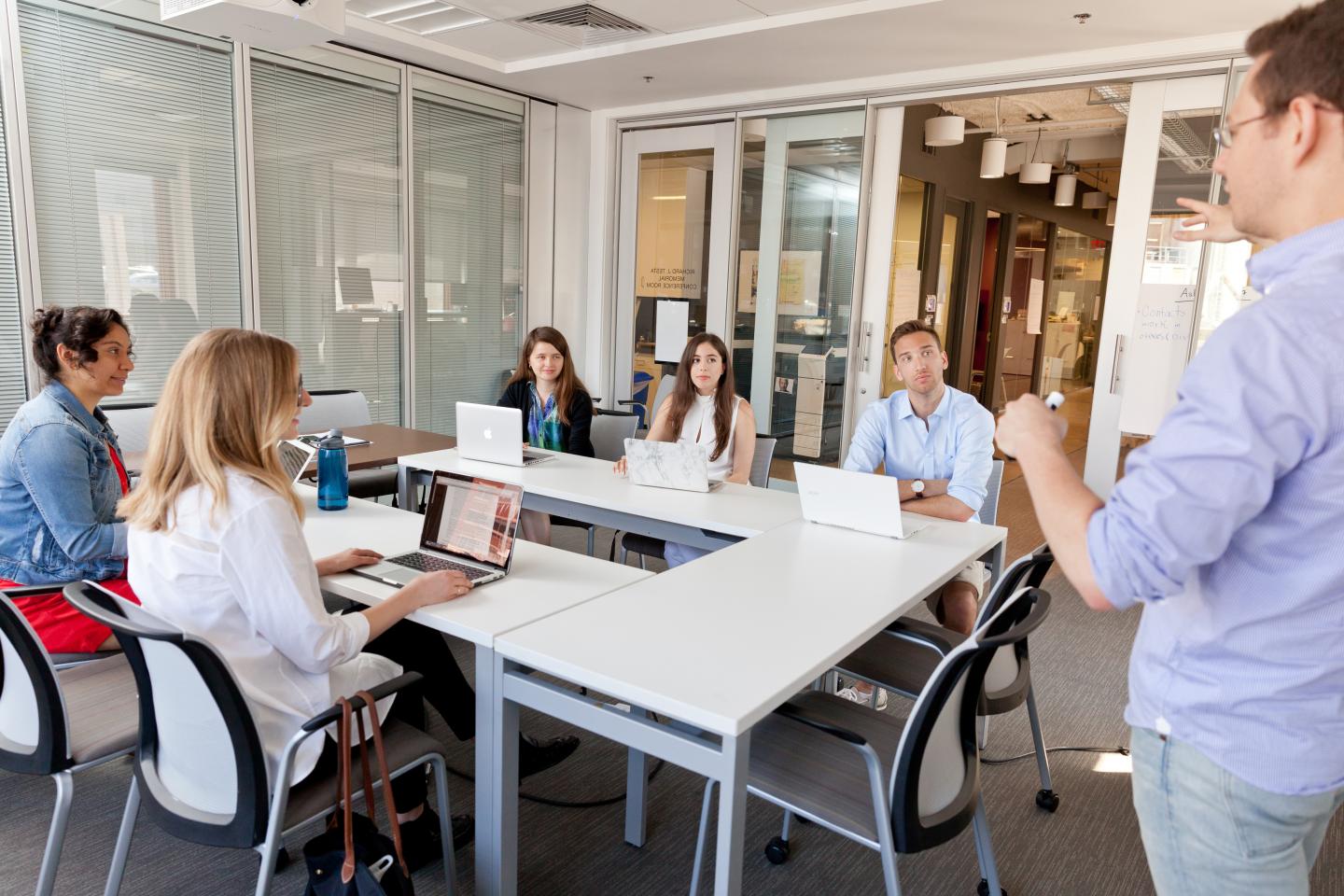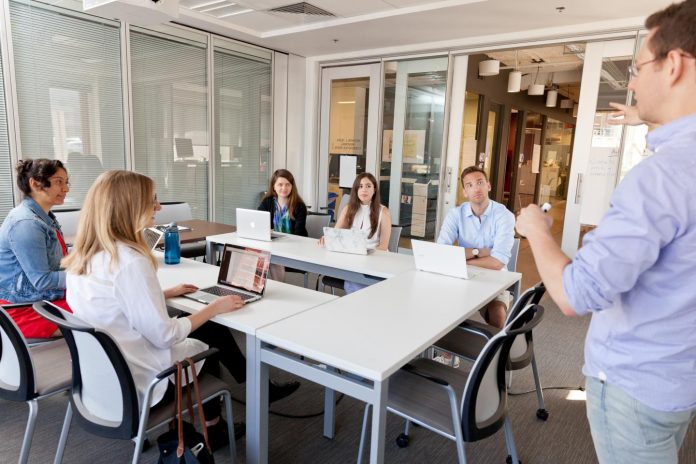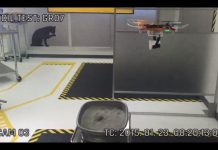
IMAGE: Assistant Director of the MIT-Boston University Startup Law Clinic, Samuel Taylor, right, speaks to participants.
view more
Credit: Photo: Dan Watkins, Boston University Photography
In 2015, the first of two MIT-Boston University law clinics was formed to provide free legal services to student innovators while giving law students experience working on technology-related legal matters.
Several metrics could be used to measure the clinics’ success since then: More than 750 student teams have received support through the program over the course of its lifetime. Those interactions have led to about 50,000 hours of client work performed by BU law students, accounting for around $17.5 million worth of legal services to students from both campuses.
The extent to which the clinics have become ingrained into each schools’ operations also underscores their success. In last year’s MIT delta v summer accelerator, two-thirds of the teams benefited from the clinics’ support. On BU’s side, 44 law students worked in the clinics during the last school year and over the summer, accounting for almost one-sixth of the entire law class.
The numbers show the importance students place on being on sound legal footing as they bring a disruptive startup or revelatory research paper out into the world. The numbers also made the two schools’ recent decision to renew the clinics’ operations for five more years an easy one.
“For a startup or an academic researcher, it’s not knowing [about potential issues] that can be the most paralyzing thing,” says Andy Sellars, a member of BU Law’s faculty who directs the Technology Law Clinic. “What we can give them is the map. We can say here are the legal issues, here’s where the law is pretty settled, here’s where the law is unsettled, here are some things to do to mitigate your risk. And by doing all that we can add some extra confidence and energy to the venture or research project.”
Coming into form
MIT and BU’s collaboration began in September of 2015, with the launch of the Startup Law Clinic as part of a new Entrepreneurship, Intellectual Property, and Cyberlaw program at BU. A year later, as planned, the Technology Law Clinic was formed.
The Startup Law Clinic helps student entrepreneurs navigate issues associated with launching a venture, like establishing a corporation or LLC, securing intellectual property, and hiring employees. The Technology Law Clinic, whose client base includes researchers as well as entrepreneurs, helps ensure students’ work aligns with laws around data collection, privacy, information disclosure, encryption, and more.
At the time of their founding, both clinics consisted of a supervising lawyer and eight student advocates.
“What we realized pretty much immediately was that wasn’t going to do it — we needed to grow,” Sellars says. “And the major story of the last four years has been figuring out what the needs are and growing to meet those needs.”
Today each clinic includes three licensed attorneys, although BU’s law students do most of the work advising and representing clients. The clinics held regular office hours at the Martin Trust Center for MIT Entrepreneurship, the Media Lab, MIT Sandbox, and elsewhere to expand access to clinic services; they have since shifted to virtual office hours due to the Covid-19 pandemic. BU’s law students also write white papers on specific legal areas and conduct presentations at locations around MIT to reach a broader audience.
“Our goal is to educate our law students to do the work and maintain the client relationships, although we’re there supervising,” says James Wheaton, who directs the Startup Law Clinic.
Since 2017, the collaboration has been bolstered by the Matthew Z. Gomes Fellowships, a program at BU Law that supports students from underrepresented communities in order to foster greater diversity among the next generation of technology and startup lawyers. Four of the seven fellows working for the clinics this summer are Gomes Fellows.
“The tech sector has known this about itself for some time: We have a major diversity problem in all corners of tech, including among the lawyers who represent tech companies,” Sellars says. “We wanted to think of some ways to improve diversity in technology by improving the pipeline.”
Legal support for impact
In 2014, MIT anthropology PhD candidate Amy Johnson filed a request under the Freedom of Information Act with the CIA,seeking information about the organization’s Twitter account. When the CIA failed to produce any documents, Johnson worked with the Technology Law Clinic to file a lawsuit against the agency, which then sent her 30 documents related to her request. Johnson and her legal team decided that wasn’t enough, and following several more rounds of litigation, she has received around 400 records. That case is ongoing and Johnson is still seeking more documents.
“We really kicked in the door by suing the CIA our first year,” Sellars says.
The CIA case is one of several high-profile projects the law clinics have been involved with. The Technology Law Clinic also advised MIT researchers who were publishing a study revealing bias in multiple company’s facial-analysis programs. The clinic helped the students ensure the study complied with computer access laws and share the results with the companies in advance of the paper’s publication.
More recently, the clinic helped researchers in MIT’s Computer Science and Artificial Intelligence Laboratory as they published technical papers that exposed security vulnerabilities in a mobile voting application that had been used in the 2018 midterm elections. The vulnerability gave hackers the opportunity to alter, stop, or expose how users voted.
“A popular area we work in is computer science, both because of the huge population of CS students at MIT, and also because a lot of advanced computer science research can feel like the sort of ‘hacking’ that is prohibited by laws like the Computer Fraud and Abuse Act,” Sellars says. “So often we’re helping clients stay on the right side of ‘anti-hacking’ laws. Then there are a lot of data related questions … [dealing with] data privacy, access to data, use of data, and web scraping, which is writing a script that systematically gathers info across the web.”
Even as the field of computer science accounts for a large portion of the clinics’ work, students from across MIT’s campus have benefited from the clinics’ support, something people familiar with MIT’s innovation ecosystem expected from the start.
“I’m not surprised at all that the clinics have supported students from all five of MIT’s schools,” says Michael Cima, MIT’s associate dean for innovation, who also serves on the board of the clinics. “Student-led startups, in particular, are very diverse in their makeup. These include not only for-profit oriented businesses but also sustainable non-profits.”
A bright future
The disruptions caused by Covid-19 have forced everyone to adjust to remote work, but they haven’t slowed the number of innovations coming out of MIT, or the law clinics’ work in support of those innovations. In fact, April 2020 was the busiest month in the clinics’ history, and they’ve continued to see a dramatic increase in work as students pursue ideas to help with the pandemic.
Now that the clinics have been renewed for five more years, its directors are brainstorming ways to further expand their services. The pandemic has shown the clinics can work even if members can’t meet their clients in person, and has reinforced the idea that technology can help scale operations.
“We know no matter how big we grow, the program will never fully meet the needs of the MIT student body, and because of that we’re trying to think of more ways to have an impact, even if you’re not a client,” Sellars says, noting the clinics have started work on guides and “how to” documents for students that will be offered on the clinics’ websites.
Regardless of where the clinics go from here, it’s clear they’ve already blossomed into an integral part of MIT’s innovation ecosystem, which bodes well for the Institute’s next generation of innovators.
“The clinics have been successful teaching and learning labs for both MIT and BU students, and have helped our students advance their passion for innovation and entrepreneurship,” says Mark DiVincenzo, vice president and general counsel at MIT. “The issues have been varied, cutting edge in many ways, allowing BU students to assist MIT students in projects that are or will impact the world.”
###
Additional background
MIT-BU Startup Law Clinic
https:/
MIT-BU Technology Law Clinic
https:/
Martin Trust Center for MIT Entrepreneurship
http://entrepreneurship.















